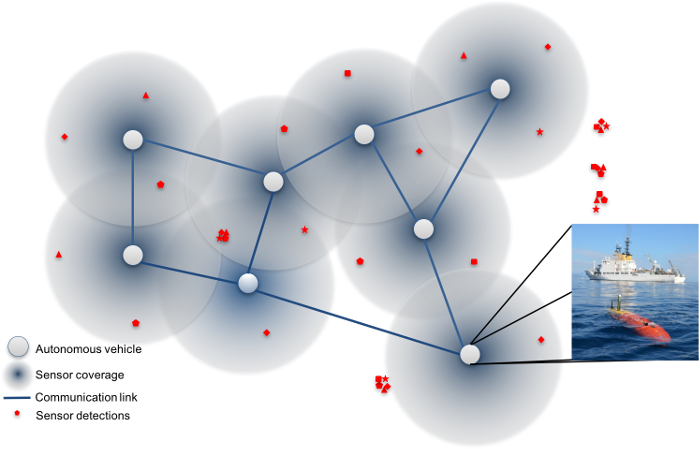Ryan Goldhahn (17-ERD-101)
Executive Summary
Our goal is to develop optimization algorithms for distributed sensor networks enabling autonomous and dynamic adjustments to address problems such as performance, jamming, and malicious attacks. These networks provide low-profile target detection, classification, and tracking in remote and/or dangerous areas; enhancing their performance supports a variety of national security missions.
Project Description
With the potential advantages that autonomous vehicles offer in cost, persistence, and stealth, they will quickly play an integral role in many national security and public safety mission areas. While large, capable, unmanned platforms for monitoring and surveillance have been constructed as surrogates for their manned counterparts, a larger number of smaller, low-power platforms offer a different approach with several advantages. As small and agile platforms, they can carry sensors into otherwise inaccessible places, and large groups of these can distribute sensors over a wider area than small numbers of more-capable sensors. Additionally, their low cost make them more expendable, leading to their use in situations where the potential damage to a more expensive platform might be prohibitive. A distributed sensor network may also be more difficult for an adversary to comprehensively disrupt or destroy. However, large distributed sensor networks suffer from the need to communicate with other nodes, rendering them susceptible to communication failures or attack, and optimization of large networks degrades under the “curse of dimensionality,” which appears repeatedly for networks of even modest size. Distributed solutions are needed to address these challenges for optimizing a network in an unknown environment, processing and fusing sensor data over local areas, and autonomous decision planning, all of which are robust to communications failures and sensor performance uncertainty. What is needed are multi-objective network optimization solutions that are near optimal and can run in real-time with limited communication and computing requirements. We are developing novel solutions to these challenges for autonomous sensor networks applied to target detection, classification, and localization, as well as tracking, exploration, and mapping problems. Our effort will be divided into four tasks: collaborative exploration and mapping, decentralized target detection and estimation, multi-objective network optimization, and simulated validation environment.
We expect to formulate decentralized signal processing and a collaborative-control framework for detection, classification, localization, and tracking problems, as well as exploration problems for a cooperating network of heterogeneous sensors. This project will develop the detection, mapping, and network adaptation algorithms for an autonomous sensor network that are robust to uncertain communications performance, jamming and malicious attacks, and uncertain or variable sensor performance. Using output from decentralized detection processing and mapping algorithms, we will develop a distributed solution for dynamically adjusting the network to maximize sensing performance, network connectivity, network convergence rate, and other performance-related parameters. The solution will provide provable performance bounds, and will be solvable in real-time with local information. This joint approach to distributed signal and information processing and distributed control with these properties would represent a significant step in end-to-end collaborative autonomy solutions and could be applicable to a large class of detection, classification, localization, and tracking problems.
Mission Relevance
This research supports the NNSA goal of expanding and applying our scientific and technological capabilities to deal with broader national security issues. Specifically, this research will serve as the framework for an autonomous sensor network applied for any number of specific target detection, classification, localization, and tracking problems, thus addressing the Laboratory's research challenges in cyber security, cyber physical resilience, and space security. This research also enhances the Laboratory's core competency in high-performance computing, simulation, and data science through development of autonomy algorithms and simulation frameworks for sensor networks. The results of this project will be relevant to areas where the Laboratory is poised to make a novel contribution and which, taken together, build a significant end-to-end capability in collaborative autonomy.
FY17 Accomplishments and Results
Though our focus was on developing general mathematical frameworks for detection and localization problems, in FY17, we also identified other classes of problems for which different solutions are required. This year we (1) pinpointed two regimes based on different sensor densities that will be the focus of work going forward, namely a dense senor network with overlapping sensor coverage and a sparse network with a fixed sensing budget; (2) developed a decentralized detection framework and applied it to the problem of radioactive source detection; (3) wrote a conference paper reporting these results; and (4) began area mapping for unmanned aerial vehicles and visualizing large, unmanned vehicle simulations.
Publications and Presentations
Kailkhura, B., et al. 2017. "Byzantine-Resilient Collaborative Autonomous Detection". 2017 IEEE International Workshop on Computational Advances in Multi-Sensor Adaptive Processing, 10-13 December 2017, Curacao, Dutch Antilles. (Accepted.) LLNL-CONF-734905.
Yen, A., et al. 2018. "Large-Scale Parallel Simulations of Distributed Detection Algorithms for Collaborative Autonomous Sensor Networks." SPIE DCS Disruptive Technologies in Information Sciences Conference, 15-19 April 2018, Orlando FL. (Accepted.) LLNL-ABS-740384.
   





